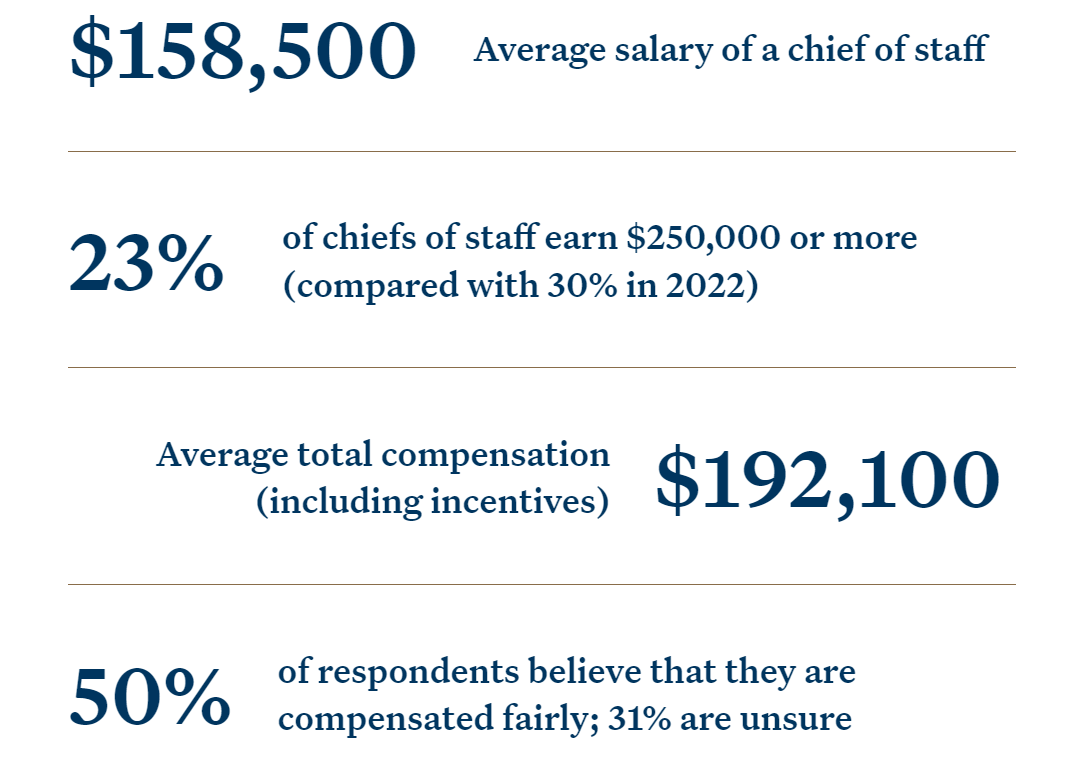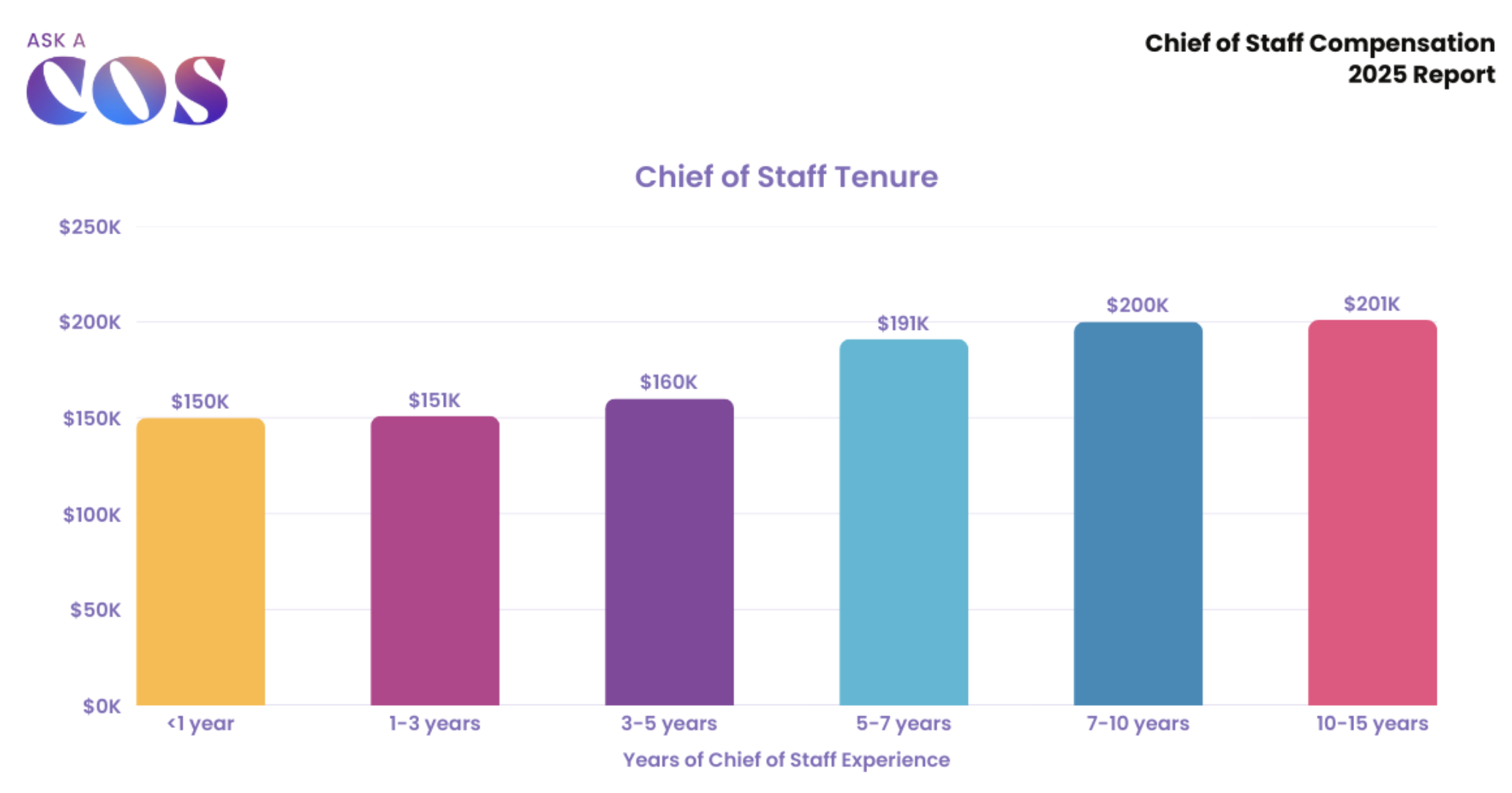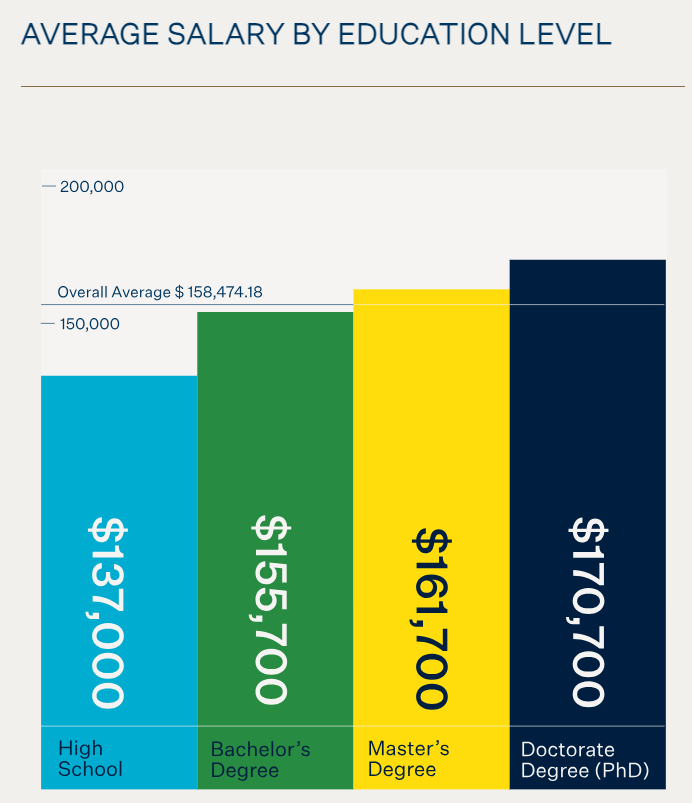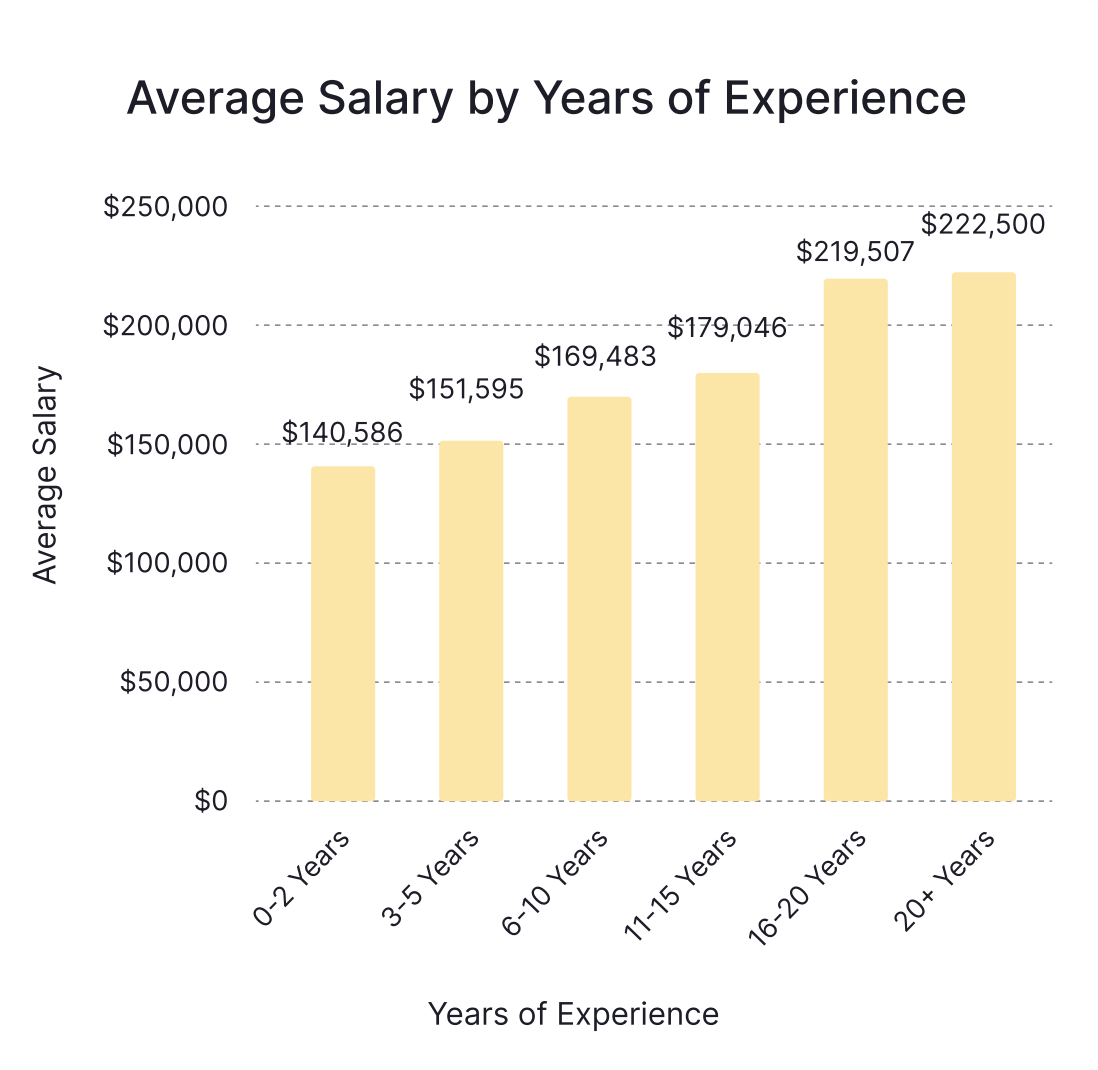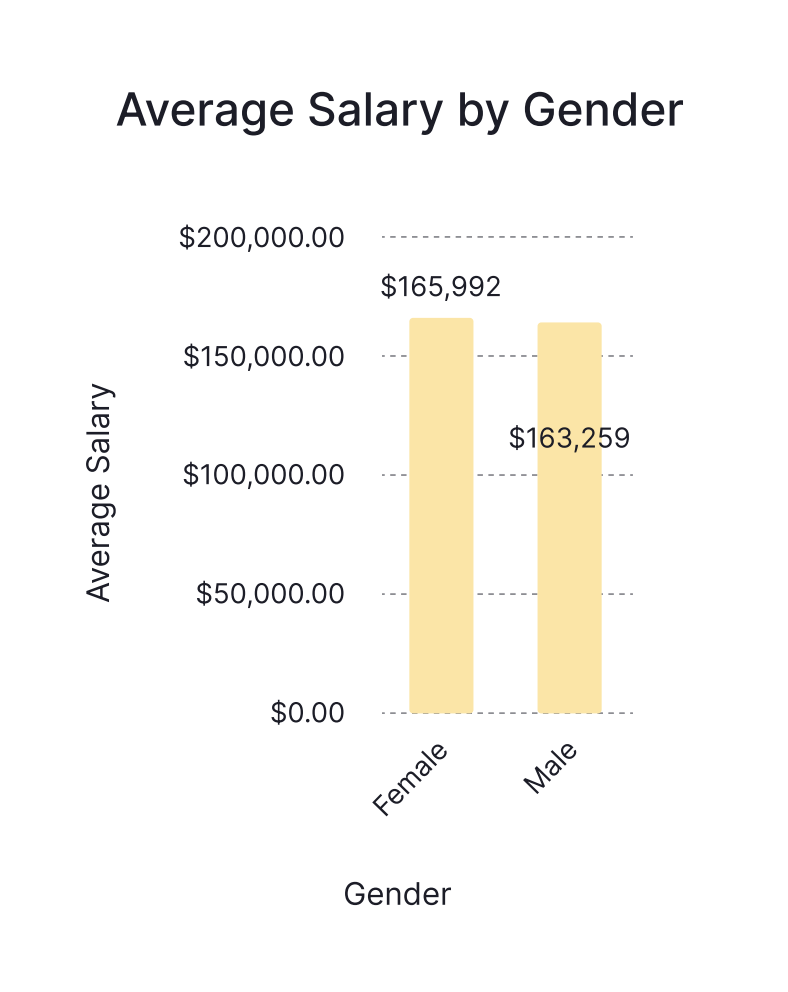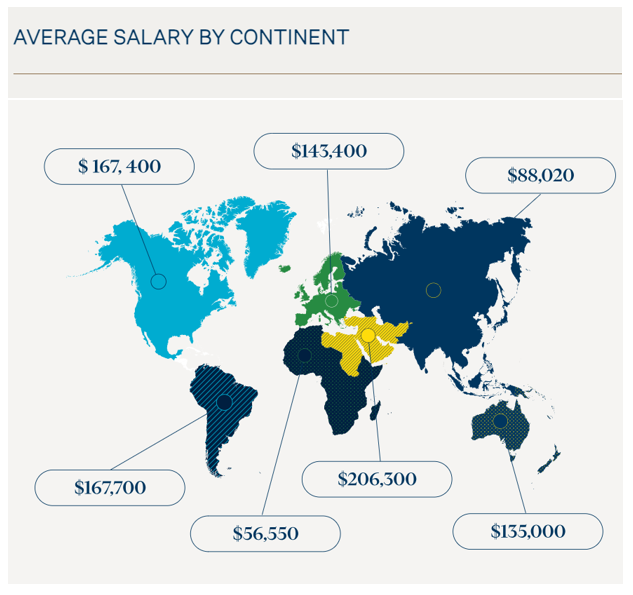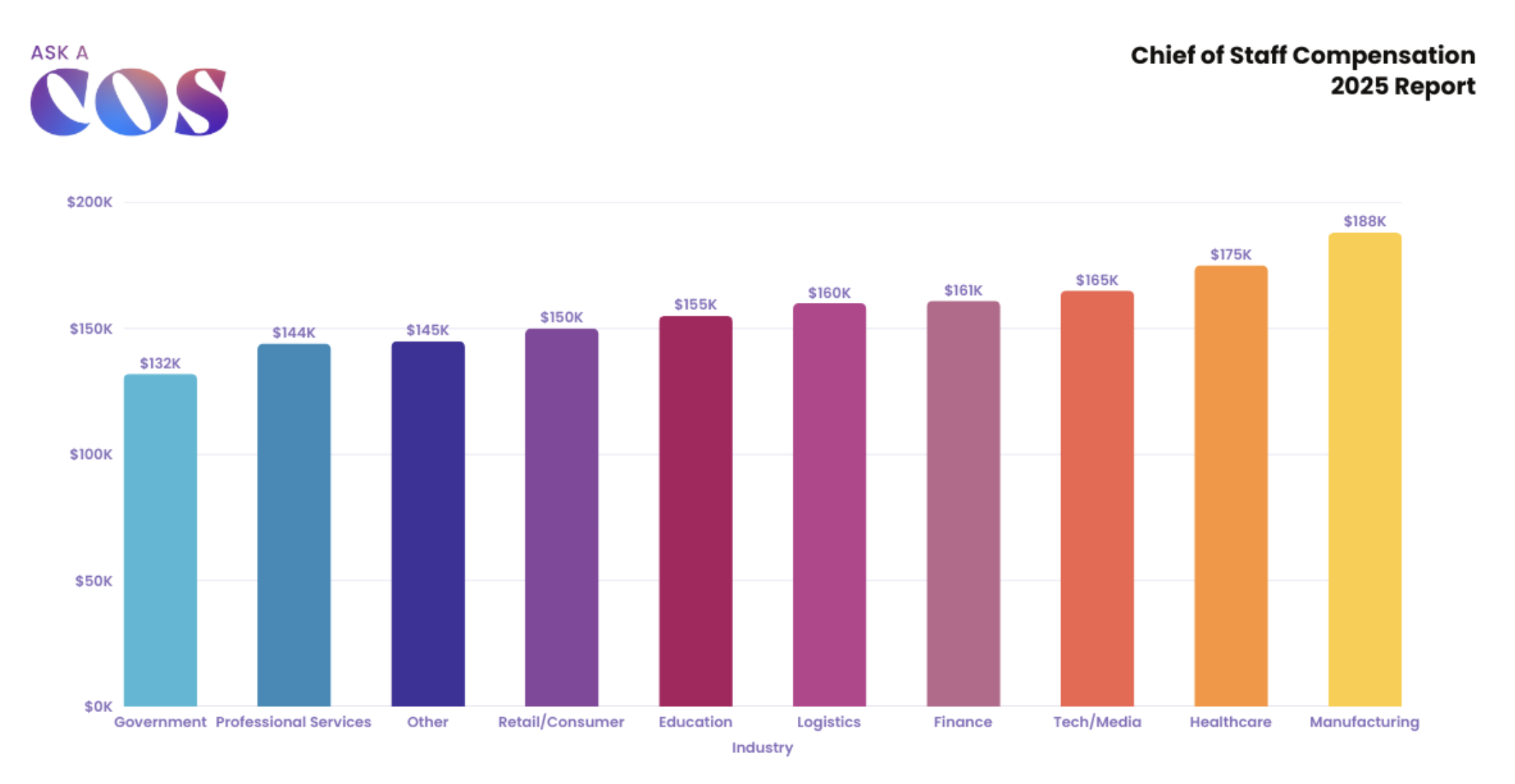Chief of Staff Salary (2025): U.S. Average Pay?
Quick Summary
The typical Chief of Staff earns between $160k and $170k per year as core compensation.
Chief of Staff salaries are primarily driven by location, experience, industry, and educational background.
Use Chief of Staff salary data to evaluate job offers. Read the full job description to make sure the compensation is aligned with the responsibilities.
How Much Does a Chief of Staff Earn? Comparing Results from Three Reports on Salary Data
In my humble opinion, the Chief of Staff position is one of the most exciting in business. The years I spent as Chief of Staff were some of the most rewarding in my own professional experiences. I learned so much working alongside our company’s Chief Executive Officer and the rest of the leadership team.
Maybe you’re looking to add a Chief of Staff to your team and you want to make an efficient decision that fits your budget. Maybe you’re eyeing some job openings yourself. Or maybe you have an interview lined up and want to gut-check your target number.
How Much Does a Chief of Staff Make?
So, how much does a Chief of Staff make?
The average core compensation for a Chief of Staff falls between $160,000 and $170,000.
Salary ranges can vary greatly based on various factors, including experience, region, industry, company budgets, and more. Of course, the full job description and responsibilities for Chiefs of Staff can also differ significantly from company to company.
Sources: Three Reports
What is a Chief of Staff’s salary? We’ll examine three main reports.
COS Network Report
Our first source comes from the Chief of Staff Network. Per their 2025 Chief of Staff Salary Report, the average Chief of Staff salary comes to $165,573, an increase of over 7% from last year’s mean salary of $154,673.
Source: Chief of Staff Network
The COS Network is a membership organization for corporate Chiefs of Staff, with events, networking opportunities, a job board, advice and insights on the role, and more. I spoke with the General Manager of the CoS Network, Rahul Desai, on my podcast. He broke down their annual salary report, including:
Average Salary by Chief of Staff Level (1-5)
Average Salary by Company Size
Average Salary by Education
Average Salary by Gender
Average Salary by Geographic Region
Percentage of Compensation by Base Salary vs. Bonus
What Roles Former Chiefs of Staff Are Currently In
Check out the full episode for more information.
Chief of Staff Association Report
Our next report comes from the Chief of Staff Association (CSA). The CSA’s 2023 Chief of Staff Compensation Report provides an average salary of $158,500, with a total compensation of $192,100.
Source: Chief of Staff Association
The Chief of Staff Association is a broad, international network of Chiefs of Staff, including corporate, non-profit, government, and military sectors. This report examines the effects of job titles, education, experience, location, and industry or sector on total compensation.
Ask a Chief of Staff Report
Our third report is from Ask a Chief of Staff, whose 2025 Chief of Staff Salary Report provides an average annual salary of $160,000.
Source: Ask a Chief of Staff
Ask a Chief of Staff describes itself as a community where Chiefs of Staff can share their experiences and knowledge with one another.
This report includes salary breakdowns by:
Age
Gender
Geography
Education
Industry
Reporting structure
Experience
Previous role
Company stage
Key Summary Points
While there are some interesting differences between these three reports (more on that below), I want to provide an upfront look at the three factors that influence Chief of Staff salary the most:
Location
Years of experience
Industry
Chiefs of Staff in North America typically earn more. People with more experience earn more. And, some industries just pay more than others.
Comparison of Reports and Factors
So, how do these factors (and more) compare across these different reports?
First, a note on recency. The reports from COS Network and Ask a Chief of Staff are based on brand-new data for 2025, while CSA’s report is from 2023. This is about as close as you can get to real-time Chief of Staff compensation data.
Next, let’s talk a little about the salary survey data behind each report.
Sample size matters! Here are the number of respondents from each report:
CSA: 244
Ask a Chief of Staff: 512
COS Network: ~400
COS Network doesn’t include the number of respondents in their report. However, you can access the raw dataset if you sign up for a membership. I got the ~400 number from my conversation with Rahul Desai. Interestingly, he also told me that 400 is about 1% of Chiefs of Staff globally — giving them a 97.5% confidence interval. The report does include some interesting comparisons of the year-over-year demographics of their respondents, which the numbers geek in me appreciated.
Education
All three reports looked at education — with some interesting and divergent results.
The numbers from CSA might look how you’d expect: more education = more money.
Source: Chief of Staff Association
Ask a Chief of Staff respondents followed a similar trajectory, with an even wider gap between those without college degrees ($120,000) and those with doctorates ($185,000). That said, one interesting facet of this report is that it says Chiefs of Staff with Master’s degrees actually make a little less ($156,000) than those with bachelor’s degrees ($160,000).
Sample size likely plays a large factor here. Respondents with a bachelor’s degree were the largest group, with smaller representation from advanced degrees such as Master’s and MBA, and very little representation at other levels of education, which may skew results.
The Chief of Staff Network’s report shows a small increase of just over 2% in average salary between a bachelor’s and a Master’s degree. Chiefs of Staff with doctorates earn about $14,000 more than the typical CoS with a Master’s, but again, there wasn’t much representation from the doctorate group.
Experience
Nothing too surprising here. Salary goes up according to the number of years on the job or years of managerial experience.
Source: Chief of Staff Network
CSA’s report also shows that salaries rise with years of experience. While their numbers cap out at 5+ years, they do break things down year-by-year, so it’s important to keep in mind that these are slightly different categories in that respect.
Gender
COS Network, CSA, and Ask a Chief of Staff all include gender in their report. And they don’t show the same thing!
COS Network shows women Chiefs of Staff making slightly more than men on average, to the tune of nearly $3,000 more in annual compensation.
Source: Chief of Staff Network
Ask a Chief of Staff, on the other hand, shows a gender gap of $5,000 between male and female respondents, with men making more.
Meanwhile, CSA shows that men make nearly $15,000 more than women in Chief of Staff roles. We were surprised to see these three surveys produce such extremely different results in this area.
Not too sure what could explain this discrepancy! That said, Ask a Chief of Staff does mention that, because less than 30% of respondents are men, “differences in sample size make direct comparisons difficult,” while COS Network says that “the role has become a key leadership pipeline for women, one of the few executive-adjacent paths where female representation far exceeds parity.”
Region
All three reports took geography into account.
COS Network shows that Chiefs of Staff make the most in North America, followed by Asia, Europe, South America, and Africa.
However, it’s important to note that COS Network grouped the Middle East and Asia together into one “Asia” category, while CSA broke things down further. According to CSA, Chiefs of Staff in the Middle East earn the most, followed by South America, North America, Europe, Australia, Asia, and Africa.
Source: Chief of Staff Association
Nearly 75% of Ask a Chief of Staff’s respondents are from the United States, so we didn’t put much weight into their geographical data.
Industry
The COS Network and Ask a Chief of Staff reports both touched on salary by industry, while CSA did not include industry data in this year’s report. There’s no clear consensus here, but there are some commonalities.
Per the COS Network report, the top-earning industries for Chiefs of Staff are:
Sports and Media
Fintech and Finance
Consumer Software
And...from Ask a Chief of Staff:
Manufacturing
Healthcare
Tech and Media
Source: Ask a Chief of Staff
So, we see somewhat similar results from these two reports, with some divergence as well. It’s no real surprise that professional/financial services and tech-related fields fared well.
Bonus Report: Glassdoor
This year, Glassdoor also published a Chief of Staff Salary study. It isn’t as in-depth as the reports discussed above, as it only includes granular data for CoS salaries by industry and years of experience. However, it includes a data set of roughly 4,500 Chiefs of Staff, making it the broadest study available.
In addition, you can sort Glassdoor’s data by both industry and years of experience. So, if you want to know what a Chief of Staff in the legal industry with no experience makes, or you’re wondering about the average salary for a CoS in tech with 15+ years of experience, Glassdoor can give you those answers.
The report states that the median total pay for a Chief of Staff is $218,000, with a base salary between $114,000 and $212,000 and additional pay valued at $50,000-$93,000.
How To Use This Data
Going into your job search, interview, or negotiation, learn all you can about the scope of the role at that particular organization so that you can come to a fair number in terms of compensation.
Expect the typical, annoying (and accurate) answer to all questions related to the Chief of Staff: "It depends." It’s important for you to understand the main factors that “it depends” on.
Make sure the organization is aligned with your personal goals. The job of Chief of Staff is not a “phone it in” job. If it's your first career path, you might take a little less than benchmark compensation or your exact pay target if it provides other opportunities — namely acquiring additional skills, exposure to top management, solving critical issues, and gaining insight into daily operations and operational activities. You can learn a lot on the job. I often compare it to an on-the-job advanced degree or mini-MBA.
Be sure to read the full job description and understand the scope, expectations, and how the organization sees this role. Don't just chase after a fancy new job title. If you'll do a lot of heavy lifting, make sure they have the right organizational structures in place.
Take a look at the lowest and highest Chief of Staff salaries for the data points that match your own scenario. Knowing your market value will help enormously during negotiations. Keep in mind a base salary number that makes you comfortable and be armed with the average total compensation for people with similar backgrounds. Also, understand the job leveling structure. Does it include Junior Chief of Staff or Deputy Chief of Staff positions, or is the Chief of Staff serving at the highest levels?
Salary Matters, But...
Salary is just one factor when you’re looking for a new job. It’s always an important one, but just one among many. How the role suits you, the opportunities for growth, how you fit into your team or department, and the overall culture of the company are important to consider, too.
Is the COS Role Right For You?
The Chief of Staff is such an exciting, dynamic role. You’re the point of contact between top management and staff members. You’re trusted to bring a unique perspective on operational activities to solve critical issues and achieve the organization’s major goals.
Your comprehensive knowledge of the overall departmental function gives your principal an invaluable leadership edge. They may trust you with the management of executive support staff. You may work directly with the organization’s president. Chiefs of Staff provide strong leadership at the highest levels and play a critical role as the right hand to the CEO or other principals.
The Chief of Staff plans special projects and broad functional objectives. You see the big picture and the little details, tying various sub-functions to the broader corporate function. You’re heading up strategic initiatives and projects of high importance.
Since this is such a unique role, there’s no clear linear career path or sequence of jobs to get there. Each Chief of Staff’s path will look different. Some transition from executive assistant, project management, or strategic initiatives. While Chief of Staff may be the end goal or final career path for many — it’s that rewarding! — it can also lead to other roles on the executive team such as Senior Vice President, Chief Operating Officer, and even Founder and CEO.
More Resources
If you’re looking for the very best Chief of Staff insights, or ways to build out additional skills, check out my book: An Insider’s Perspective on the Chief of Staff. I’m also running a special Chief of Staff series on my podcast, Leveraging Leadership, and have more resources available at https://chiefofstaffbook.com.
Master the data you need to negotiate your next executive compensation package with confidence. → Join the newsletter
About The Author
Emily Sander is an ICF-certified leadership coach with more than 15 years of experience in the business world and the author of Hacking Executive Leadership. She’s been featured in several print publications, online articles, and podcasts, including CEO Today Magazine, Leading to Fulfillment, and Leadership Powered by Common Sense.
Emily has a passion for helping business leaders reach their full potential. Go here to read her story from seasoned executive to knowledgeable coach. If you want to send Emily a quick message, then visit her contact page here.


